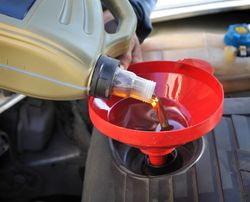How Often Does Your Car Need an Oil Change?

When it comes to oil changes, you’ve likely been told you should change it every 3,000 miles, or roughly every three months. While most modern cars can go for quite a bit farther without needing fresh oil, it’s still a crucial part of auto maintenance. Changing your oil will ensure top performance, fuel efficiency, and will also protect your car’s warranty.
A Guide to Oil Changes
Choosing the Right Type of Oil
The frequency with which you need to change your oil depends partially on the type you use. There are four basic types of oil available in various mixtures of synthetic and petroleum-based ingredients:
- Fully Synthetic: This motor oil is ideal for high-performance sports vehicles such as Mercedes Benz®. These are typically rated for 10,000-12,000 miles before they require changing.
- Synthetic Blend: These are popular for trucks and SUVs due to their ability to improve fuel economy for heavy vehicles. Vehicles benefit from the long life of their synthetic components, so you’ll only need a fresh change every 7,000-8,000 miles.
- High-mileage Oils: These varieties are formulated to boost performance in cars with more than 75,000 miles on their odometers. Oil changes depend on the condition of the engine itself. If you find your oil needs constant replenishment or is prone to pressure loss, replace the oil sooner rather than later.
- Conventional Oil: Conventional brands are the preferred choice for most new cars, in which the engine can cope with the oil’s higher volatility. These oils should be changed every 5,000-7,500 miles with regular highway usage.
How Your Driving Style Will Influence Your Oil Changing Needs
 When thinking about oil efficiency, it’s vital to consider the type of driving you’re doing. Many drivers who use their cars only for short trips may assume the lighter usage allows them to skip oil changes. However, start-stop driving can actually be harder on your engine because the oil won’t always reach the optimal temperatures needed to ensure proper operation.
When thinking about oil efficiency, it’s vital to consider the type of driving you’re doing. Many drivers who use their cars only for short trips may assume the lighter usage allows them to skip oil changes. However, start-stop driving can actually be harder on your engine because the oil won’t always reach the optimal temperatures needed to ensure proper operation.
If your oil isn’t warm enough, it won’t lubricate the components of your engine well enough to avoid harmful friction and overheating. You may end up needing to change your oil more frequently to offset the harsh wear on components.
Combustion produces water as a byproduct, and the vapor is released into the engine compartment. If the vapor isn’t burned off, it can settle into the oil, turning it into sludge and reducing its ability to protect your car and ensure fuel efficiency. Prevent this by allowing your car to warm up before driving it and scheduling regular oil changes.
When you’re in need of car maintenance, you can count on the professionals at A-1 Auto Service in Lorain, OH. These ASE-certified mechanics offer services, including oil changes, tuneups, wheel alignment, and brake repairs. Learn more about their service offerings online, or call (440) 245-0076 to book an appointment.
About the Business
Have a question? Ask the experts!
Send your question

